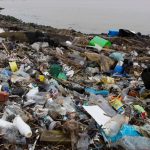Plastic production wreaks havoc on people and the planet—from fracking wells and pipelines in Pennsylvania, to air pollution from plastic plants in Scotland.
We are choking the planet in plastic. Everything from wasteful water bottles to grocery shopping bags are polluting our waterways, and endangering marine life and the natural environment. It’s fair to say that even the most casual news consumer has probably encountered a Facebook post, TV report, or radio segment about the garbage patches in the Pacific Ocean.
But what’s less well-known is what is fueling this plastics binge: fracking. As the Guardian recently reported, in less than a decade, tens of billions of dollars have been invested in creating new manufacturing sites around the world to turn fossil fuels into resin pellets used to manufacture plastic products. The companies profiting off this surge in plastics are contributing to a growing climate crisis while generating mountains of plastic garbage.
http://www.yesmagazine.org/planet/we-are-drowning-in-plastic-and-fracking-companies-are-profiting-20180214

